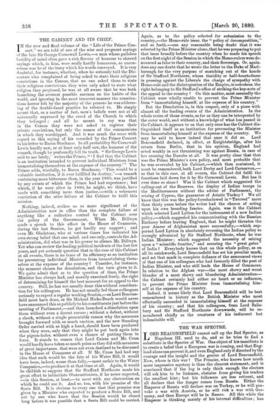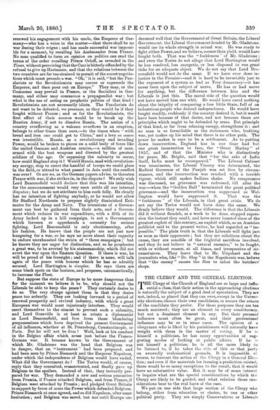THE WAR SPECTRE. renewed his engagement with his uncle, the
Emperor of Ger- many—who has a voice in the matter—that there shall be no war during their reigns ; and has made successful war impossi- ble for a moment, by recalling his Ambassador from France. No man qualified to form an opinion OR politics can read the terms of the order recalling Prince Orloff, as revealed in the Times, without perceiving thatthe Czar is bitterly offended by the refusal to give up Hartmann, and that the relations between the two countries are far too strained to permit of the secret negotia- tions which must precede a war. "Oh," it is said," but the Pan- slavists or the Revolutionists may coerce or supersede the Emperor, and then poi= out on Europe." They may, or the Commune may prevail in France, or the Socialists in Ger- many, and either may commence a propagandist war ; but what is the use of acting on prophetic politics of that kind ? Revolutionists are not necessarily idiots. The Panslavists do not want to be defeated, we presume, as they would be if they fought without France; and as for the Revolutionists, the first effect of their success would be to break up the Russian Army, if not to dissolve Russia. The notion of a country overflowing as a volcano overflows in an eruption, belongs to other times than ours,—to the times when "with bread and iron one could get to China," and a levy en masse was irresistible. Russia, as a revolutionary and invading Power, would be broken to pieces on a solid body. of force like the united German and Austrian armies,—a million of men, armed with the best weapons and direoted by the greatest soldiers of the age. Or supposing the calamity to occur, how could England stop it? Would Russia, mad with revolution- ary energy, stop to count the handful of troops we could place in the field, or attend to what passed in Asia until the conflict was over? Or are we, as the German papers advise, to threaten France with war, if she strikes in, in the dispute ? We only wish Lord Beaconsfield would declare that this was his intention, for the announcement would very soon settle all our internal disputes ; but we do not attribute to him such folly. He clearly has no intention of fighting anybody, or he would not allow Sir Stafford Northoote to propose slightly diminished Esti- mates for the Army and Navy. The intentions of a Govern- ment can best be gathered from their acts, and a Govern- ment which reduces its war expenditure, with a fifth of its Army locked up in a hill campaign, is not a Government which foresees or apprehends a necessity for serious fighting. Lord Beaconsfield is only electioneering, after his fashion. He knows that the people are not just now hungering for a war, so he says no more about their capacity to endure unexhausted the strain of "three campaigns ;" but he knows they are eager for distinction, and so he prophesies a great war, to be averted by his statesmanship, which did not avert the war upon the Eastern Question. If there is war, he will be proud of his foresight ; and if there is none, will talk again of the peace with honour which he has so adroitly secured. Lord Hartingion is simpler. He says there are some black spots on the horizon., and proposes, unromantically, to increase the Fleet.
- But suppose the state of Europe to be mom dangerous than kr the moment we believe it to be, why should not the Liberals be able to keep the peace They certainly desire to do so. The very charge against them is that they desire peace too ardently. They are looking forward to a period of renewed prosperity and revived industry, with which a great European war would most injuriously interfere. They would exert themselves to the utmost to prevent such a calamity, and Lord Granville is at least as astute a diplomatist as Lord Beaconsfield, and free from those blundering prepossessions which have deprived the present Government of all influence, whether at St. Petersburg, Constantinople, or Paris. But he will not be firm ? Well, look at his conduct in the Belgian affair which arose just before the Franco- German war. It became known, to the Government of which Mr. Gladstone was the head that Belgium was in danger, that an "instrument" had been prepared, and had been seen by Prince Bismarck and the-Emperor Napoleon, under which the independence of Belgium would have ended. What did the Government do ? The Tories would, of course, reply that they consulted, remonstrated, and finally gave up Belgium to the spoilers. Instead of that, they instantly pre- pared for war. They demanded a new and serious guarantee from Prussia, if France attacked Belgium, and from France, if Belgium were attacked by Prussia ; and pledged Great Britain to support by force of arms the Power which defended Belgium.
Prince Bismarck at once agreed, and so did Napoleon, after some hesitation ; and Belgium was saved, but not until Europe un- derstood well that the Government of Great Britain, the Liberal Government, the Liberal Government headed by Mr. Gladstone, would use its whole strength in actual war. He was ready to fight either Power,and we believe, sooner than yield, would have fought both. That was the " feebleness " of Mr. Gladstone ; and even the Tories do not allege that Lord Eftutington would be less resolved, less energetic, or less disposed to run great risks for an adequate object. We do not say that Lord Bea- consfield would not do the same. If we have ever done in- justice to the Premier—and it is hard to be invariably just to the exponent of a system so bad as Tory democracy—it has never been upon the subject of nerve. He has or had nerve for anything, but the difference between him and the Liberals is just this. The moral side of the question would not have moved him one whit. He would have cared nothing about the iniquity of conquering a free little State, full of an industrious people who desired independence. He would have fought readily, recklessly if the country desired it, but it would have been because of that desire, and not because there are principles which ought to be defended by arms. But principle of that kind, so far from relaxing energy, strengthens it ; and no man is so formidable as the statesman who, loathing war, yet makes up his mind that there is no other path. The peace he makes is sure to be a settlement. As to putting down insurrection, England has in our time had but one great insurrection to face, the "Great Mutiny" of 1857, and of that the Minister who is distinctively for peace, Mr. Bright, said that "for the sake of India itself, India must be reconquered." The Liberal Cabinet was unanimous, the Liberal Viceroy was determined, the Radical Governor of the Punjab was set free by circum- stances, and the insurrection was crushed with a terrible vigour, which still makes Indians shake. No compromise was discussed, no grievance was redressed, till after the war—when the "Golden Bull" terminated the great political grievance—and the insurrection was suppressed as Wel- lington would have suppressed it. That was the " feebleness " of the Liberals, in that great crisis. We do not say the Tories would not have done the same. We firmly believe they would. The difference is that the Liberals did it without flourish, as a work to be done, stopped repres- sion the instant they could, and have never boasted since of the greatest exploit of this century, an exploit which, as an Austrian publicist said to the present writer, he had regarded as "im- possible." The plain truth is, that the Liberals will fight just an soon as their opponents ; but they are solicitous about the cause, they are sensible of the frightful sacrifices involved, and they do not believe in "natural enemies," to be fought, with or without reason, at all times, and irrespective of cir- cumstances. They leave that to Mr. Urquhart and the journalists who, like "Dr. Slop" in the Napoleonic war, believe that "the enemy" causes the flies to infest the butchers' shops.



































 Previous page
Previous page